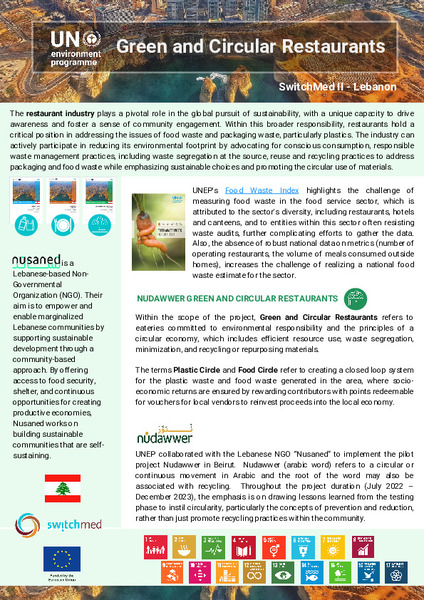| dc.contributor | Industry and Economy Division | en_US |
| dc.contributor.author | United Nations Environment Programme | en_US |
| dc.coverage.spatial | Lebanon | en_US |
| dc.date.accessioned | 2023-12-19T07:51:58Z | |
| dc.date.available | 2023-12-19T07:51:58Z | |
| dc.date.issued | 2023-12 | |
| dc.identifier.uri | https://wedocs.unep.org/20.500.11822/44489 | |
| dc.description | The restaurant industry plays a pivotal role in the global pursuit of sustainability, with a unique capacity to drive awareness and foster a sense of community engagement. Within this broader responsibility, restaurants hold a critical position in addressing the issues of food waste and packaging waste, particularly plastics. The industry can actively participate in reducing its environmental footprint by advocating for conscious consumption, responsible waste management practices, including waste segregation at the source, reuse and recycling practices to address packaging and food waste while emphasizing sustainable choices and promoting the circular use of materials. | en_US |
| dc.format | pdf | en_US |
| dc.language | English | en_US |
| dc.rights | Public | en_US |
| dc.subject | restaurant | en_US |
| dc.subject | food waste | en_US |
| dc.subject | packaging waste | en_US |
| dc.subject | plastic | en_US |
| dc.title | Green and Circular Restaurants: SwitchMed II in Lebanon - SwitchMed Programme [Factsheet] | en_US |
| wd.identifier.sdg | SDG 2 - No Hunger | en_US |
| wd.identifier.sdg | SDG 9 - Industry, Innovation and Infrastructure | en_US |
| wd.identifier.sdg | SDG 15 - Life on Land | en_US |
| wd.topics | Chemicals and Pollution Action | en_US |
| wd.topics | Finance and Economic Transformations | en_US |
| wd.identifier.pagesnumber | 2 p. | en_US |


